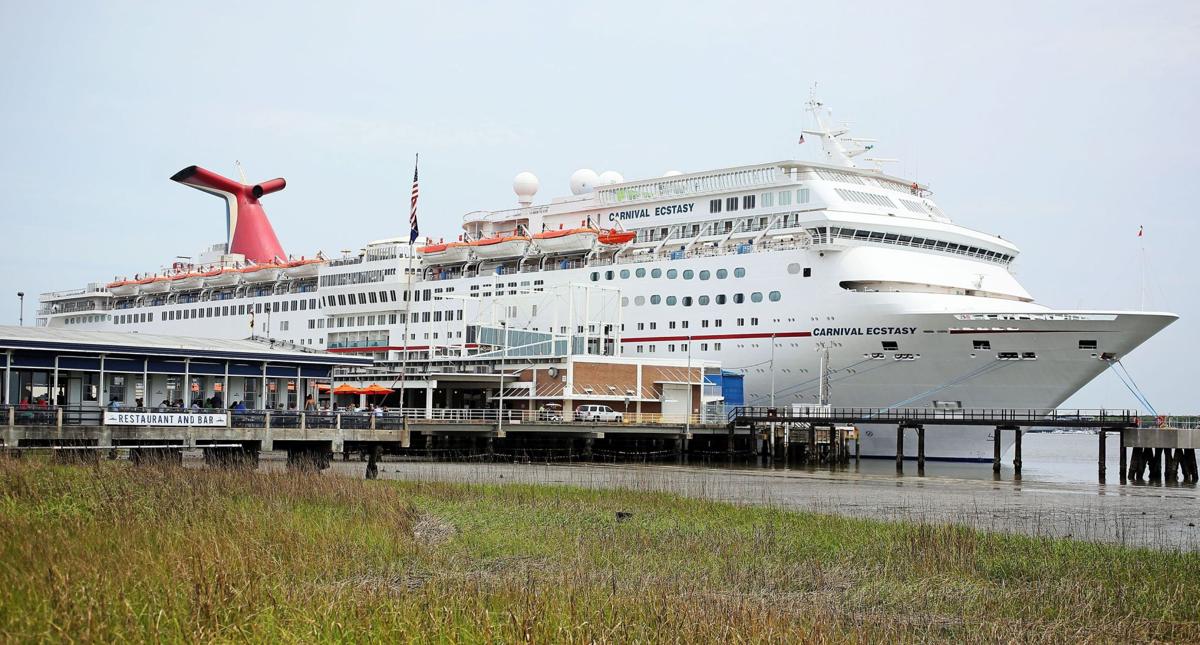Carnival Pleads Guilty to Environmental Felonies

Cruise Ship Pollution Case has Consequences for Charleston’s Ecstasy

The Charleston-based Carnival Ecstasy and all other cruise ships sailing under Carnival Corp.‘s eight brands will be under strict environmental monitoring during the next five years – the result of an agreement between the company and federal prosecutors to end a criminal pollution case.
Carnival’s Princess Cruises division agreed this month to plead guilty to seven felony charges and pay a record $40 million fine after it was caught dumping thousands of gallons of oily waste, called bilge water, into the ocean for about eight years. The Port of Charleston was among the ports that prosecutors say Princess Cruises visited when the pollution scheme was taking place, and that pollution likely occurred in U.S. waters.
Princess Cruises’ employees tried to cover up the pollution with false entries in record books used to track the waste, court records show. The cruise line will officially enter its guilty plea at a Dec. 20 hearing in federal court in Miami.
Prosecutors focused on five Princess Cruises ships, but court documents show vessels in Carnival’s other divisions have kept inaccurate waste discharge records in violation of federal law. The other ships aren’t named, but U.S. Attorney‘s offices in 18 districts, including South Carolina, have agreed to forego prosecution in exchange for the guilty plea.
That doesn’t mean the other ships are getting off scot-free.
Under the agreement, all of Carnival’s 99 ships, including the Ecstasy, will have to take part in a court-monitored environmental compliance program while Princess Cruises is on probation for the next five years.
The plan includes third-party auditors to make sure the vessels follow all U.S. pollution control laws. Carnival will have to update its policies and training programs and make sure an environmental officer is on each ship. There will be inspections by the U.S. Coast Guard and annual audits.
And Carnival will have to make sure there is enough money available to properly dispose of waste while ships are in port rather than at sea. Prosecutors said on one of the reasons Princess Cruises dumped its pollution at sea was to save on costs.
The agreement is a good start, according to Southern Environmental Law Center attorney Blan Holman. But he says more needs to be done.
“It only lasts for five years and there is zero transparency to the public to monitor things,” Holman said of the program. “If the cruise lines were serious about stopping illegal pollution, they would put all their records somewhere so the public in Charleston could easily see them.”
Holman is representing several historic preservation and neighborhood groups in Charleston who want to block the State Ports Authority‘s plans to develop a new passenger terminal for the Ecstasy and other cruise ships at Union Pier. The SPA has said the new terminal, which would just north of the current building, would alleviate traffic congestion and provide more modern facilities.
The terminal dispute focuses more on the cruise industry’s impact on the city’s densely populated Historic District, but the Princess Cruises revelations have renewed the environmental concerns.
Holman said current pollution laws are too weak, allowing cruise ships to dump grease and some bathroom waste as close as four mile from the coast.
“All of the pollution happens below deck and is almost impossible to detect,” Holman said. “They got caught this time only because someone on the inside defected and blew the whistle.”
For its part, Princess Cruises called its employees’ actions “inexcusable” and said in a statement that it is “extremely disappointed” in the pollution violations.
“Although we had policies and procedures in place, it became apparent they were not fully effective,” said Princess Cruises, which cooperated with federal authorities in the investigation. “We are very sorry that this happened and have taken additional steps to ensure we meet or exceed all environmental requirements.”
The cruise industry has long been criticized by environmental groups such as Friends of the Earth, which often gives Carnival subsidiaries poor or failing marks on pollution control measures in the nonprofit’s annual industry report cards. The Ecstasy, launched in January 1991 and now one of Carnival’s oldest ships, received a D-minus from the group this year.
Friends of the Earth said in a statement that there is “an ongoing lack of initiative by cruise companies to install technologies that reduce their air and water pollution impact on travel destinations and local peoples.”
The Princess Cruises case was much more blatant, prosecutors say, with what appears to be a concerted effort by the cruise line to skirt pollution laws.
“The pollution in this case was the result of more than just bad actors on one ship,” John Gruden, assistant attorney general with the U.S. Justice Department, said in a statement. “It reflects very poorly on Princess’ culture and management. This is a company that knew better and should have done better. Hopefully the outcome of this case has the potential not just to chart a new course for this company, but for other companies as well.”
Holman said he’s skeptical because the agreement doesn’t spell out specific penalties for violations.
“Voluntary agreements are meaningless,” he said. “Unless there are consequences, nothing happens and cost cutting will lead to illegal dumping.”
Reach David Wren at 843-937-5550 or on Twitter at @David_Wren_
